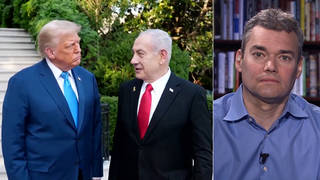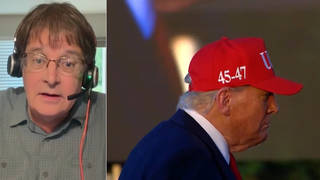
Guests
- Jules Boykoffassociate professor of political science at Pacific University and currently a visiting scholar at the University of Brighton. He has been in England since April following the buildup to the Olympics, researching a book on dissent and the Olympics. He played for the U.S. Olympic soccer team in international competition from 1989-1991.
Links
- "Olympian Arrogance." Opinion By Jules Boykoff. (New York Times, July 4, 2012)
- Lockdown in London: Professor, Ex-U.S. Athlete Jules Boykoff on Olympic Censorship & Militarization (Democracy Now!)
- Democracy Now! has reports on dissent from recent summer and winter Olympic events. Watch them!
- More information about Jules Boykoff
- Fourman Films
While NBC has been airing wall-to-wall coverage of Olympic Games in London, little attention has been paid to what has taken place behind the scenes and just outside Olympic Park. London police arrested 182 people Friday for taking part in the monthly Critical Mass bike ride during the Olympics’ opening ceremony. Meanwhile, public outcry is growing after thousands of fans were told the Games were sold out, but prime seats reserved largely for sports federations and corporate sponsors have remained empty. Although many locals cannot afford to attend the Games, this year’s Olympics is estimated to cost British taxpayers a staggering $17 billion. Residents have been subjected to sweeping censorship laws enacted by their government at the behest of the International Olympic Committee. Meanwhile, activists are outraged that the Olympics’ long list of sponsors include Dow Chemical and BP, companies with human rights records that critics say are at odds with the Olympic ideals of global peace and goodwill. We go to London to speak with scholar and former U.S. soccer team member Jules Boykoff, who has been in England since April researching a book on dissent and the Olympics. “The Olympics provide a real opportunity for activists,” ,” Boykoff says. “We often say [at protests] that the entire world is watching, the whole world is watching. And, in fact, at the Olympics, it almost is. This is a real opportunity for activists to put their ideas in front of people who might not otherwise be able to or willing to listen to them.” [includes rush transcript]
Transcript
AMY GOODMAN: We begin our show with the 2012 Summer Olympic Games, where 10,000 athletes from across the world are competing at the Olympic Park in East London. While NBC has been airing wall-to-wall coverage of the Games, little attention has been paid to what has taken place just outside Olympic Park. In the latest crackdown on dissent, London police arrested 182 people Friday for taking part in the monthly Critical Mass bike ride. The ride took place during the Olympics’ opening ceremony. The cyclists say they were kettled by police and held overnight. One of those arrested was a 13-year-old schoolboy. Another was a protester who identified herself as Melanie.
MELANIE: The authorities want to stamp out dissent. That’s—that’s why I was arrested. And John Carlos, who’s an Olympic hero, came to speak in London, short while ago, and he got us to—during his talk, he got us to repeat, “I am not afraid of offending my oppressor.” So I’d just like to do that right now, really, because I think—I think that’s really important, that we’re not silenced by heavy-handed authorities trying to stamp out any kind of dissent. You know, we have a right to do this in a democratic society. We ought to be able to challenge. And it’s not appropriate—it’s not appropriate that people are treated as criminals for speaking the truth, is what it comes down to. So, please repeat after me: I am not afraid of offending my oppressor.
CROWD: I am not afraid of offending my oppressor. (Video: Paul Hanes / Fourman Films)
AMY GOODMAN: London has rolled out its largest security operation since World War II. Approximately 18,200 armed forces personnel are now providing security for the Olympic Games—almost double the number of British troops serving in Afghanistan. Helicopters, fighter jets, bomb-disposal units are all on standby. The Ministry of Defense has also attached missile launchers to roofs of some London residential buildings. London Mayor Boris Johnson defended the massive security operation.
MAYOR BORIS JOHNSON: We were always going to have loads of military personnel anyway, so that really hasn’t changed. Plus, B, I don’t personally—I think most people in this country don’t have any objection at all to seeing venues being properly invigilated by professional military armed services people.
AMY GOODMAN: Meanwhile, inside the Olympics, the London Organizing Committee is trying to quell public outcry over the empty seats at Olympic venues. Thousands of fans told the Games were sold out for years, while prime seats reserved largely for sports federations and corporate sponsors have remained empty. Organizers have started drafting in local children and army volunteers to fill the empty bleachers. The chairman of the London Organizing Committee, Sebastian Coe, says he’s trying to resolve the issue.
SEBASTIAN COE: I don’t want to see swaths of those seats empty, and that’s why we—you know, we will make sure, where we possibly can, that we get people into those seats, as and when they’re not being used.
AMY GOODMAN: Although many locals can’t afford to attend the Games, this year’s Olympics is estimated to cost the British taxpayers a staggering $17 billion. At the same time, residents near the Olympic Park have been subjected to sweeping censorship laws enacted by their government at the behest of the International Olympic Committee. The laws limit the use of Olympic language and imagery strictly to official sponsors, such as Visa, McDonald’s and GE. Meanwhile, activists are outraged that the Olympics’ long list of sponsors includes companies such as Dow Chemical and BP. They say the corporations’ human rights records are at odds with the Olympic ideals of global peace and goodwill.
We go now to London. We’re joined by Jules Boykoff. He is associate professor of political science at Pacific University, visiting scholar at the University of Brighton. He has been in England since April following the buildup to the Olympics and is writing a book on dissent and the Olympics. He played for the U.S. Olympic soccer team in international competition from 1989 to 1991 and had a piece in the New York Times headlined “Olympian Arrogance”.
Jules Boykoff, welcome to Democracy Now! Let’s start off with the protests outside and the thousands of empty seats inside the Olympic arenas.
JULES BOYKOFF: Right. So, last weekend, the Counter Olympics Network organized a large mobilization on last Saturday, where more than a thousand people showed up from 50 different groups to protest what they see as the injustices around the Games. We took a march through some of the areas that are affected by the Olympics, walked through Bow Quarter, which includes a tall tower where some of those surface-to-air missiles that you mentioned are located—we saw army personnel peeking their heads over the top of the roof and looking down at us kind of curiously—moving on to the end, where there were speakers, some of which we heard from in your clips running into this.
So, I think it’s important actually to take a step back before we think about the tickets and think about why people might be upset about the tickets in the bigger picture. And that is because people in London have paid for these Games, and they definitely don’t feel like they get what they’re paying for. Back in 2005, when London won the bid for the Games, they told their citizens that the Games were going to cost about $3.5 billion. After that, the price tag catapulted, as soon as they learned that they won the bid, pointing some people to say that, in fact, lowballing the costs and overhyping the benefits has become an Olympic sport in itself. By now, you can see the costs have gotten to almost $18 billion. And I think those numbers are staggering in themselves, but they deserve a closer look. If you calculate who’s actually kicking in that money, somewhere between 88 and 98 percent is being paid for by the British taxpaying public, so 88 to 98 percent. British taxpayers are told that this is a public-private partnership, but it’s an extremely lopsided one at that.
This led to the question among people: for whom does this Olympics juggernaut boom? Moody’s gave a really clear answer to that question in the lead-up to the Games, when they issued a report that said, actually, there’s really not going to be any long-term gain for Londoners from hosting the Olympics, but in the short term, Moody’s said, that the beneficiaries would be what they call “corporates.” Recently, Tony Blair, who was instrumental in getting the bid for London back in 2005, said, “Hey, you people questioning the Games, just be quiet. This is going to be a, quote, 'gigantic schmooze-athon.'” Well, it’s clear that he was talking about the Moody’s “corporates” when he was talking about that “gigantic schmooze-athon,” because that schmooze-athon is not going to be for the people of Newham, one of the boroughs, one of the poorest areas in London who’s hosting the Games. It’s not going to be for the people of the Clays Lane Estate, who were kicked out of their homes, some 400-plus of them, and had their places bulldozed to make way for Olympic venues. It’s going to be for the corporates. And this is extremely painful in the context of European austerity. People here in London know that Europe is roiling in austerity. They’ve seen serious budget cuts here in the U.K., and they’re none too happy about having to pay the price for this Olympic Games.
Now, in terms of the tickets, that’s been especially painful because they’ve handed over large blocks of tickets to the international sports federations, to the corporate sponsors, and also to that International Olympic Committee—huge blocks, millions of tickets that they apparently aren’t using. Also, I should say, members of the media don’t seem to be using their tickets, as well. Meanwhile, there were tons of Londoners and people from around the country that applied to get tickets but were turned away. So people across the political spectrum are unhappy about the funding of the Games and how that’s now playing out in terms of ticketing.
AMY GOODMAN: Last Thursday, Republican presidential candidate Mitt Romney drew a bit of controversy in Britain after he questioned the country’s preparedness to host the Olympic Games. Romney was speaking to NBC’s Brian Williams in London.
MITT ROMNEY: There are a few things that were disconcerting: the stories about the private security firm not having enough people, the supposed strike of the immigration and customs officials. That, obviously, is not something which is encouraging, because in the Games, there are three parts that make Games successful. Number one, of course, are the athletes. That’s what overwhelmingly the Games are about. Number two are the volunteers, and they’ll have great volunteers here. But number three are the people of the country. Do they come together and celebrate the Olympic moment? And that’s something which we only find out once the Games actually begin.
AMY GOODMAN: In response to Romney’s comments on the Olympics, British Prime Minister David Cameron said his country is adequately prepared for its host duties.
PRIME MINISTER DAVID CAMERON: Well, look, we are holding an Olympic Games in one of the busiest, most active, bustling cities anywhere in the world. I mean, of course it’s easier if you hold an Olympic Games in the middle of nowhere.
AMY GOODMAN: Jules Boykoff, your response?
JULES BOYKOFF: Well, it’s amazing. When Mitt Romney arrived on the British shores, he seems to have turned himself into a two-legged gaffe-o-matic, and people across the political spectrum have been laughing at him, basically. He was pilloried in the press, from the right-wing Daily Mail to the left-wing Guardian. My favorite one has to be from the Evening Standard, where they referred to him as, quote, “the American Borat,” in response to the Sacha Baron Cohen character.
So, you mentioned Cameron came out and spoke strongly against him. So did Boris Johnson, in a public space. So has Jeremy Hunt, the conservative culture minister. And what’s interesting to me about this is that these are conservative politicians who are speaking out against Romney. Now, to be sure, Romney has attacked something that they’ve invested a lot of their political capital in, but also it just points to how far right the political center of gravity in the United States has shifted, where conservatives here in the U.K. really feel no responsibility whatsoever to support the conservatives in the United States. And the longer I’ve been here, the more remarkable it really is. David Cameron and his crew have a lot more in common, in terms of policies, with people like Barack Obama than they do with people like Mitt Romney or even like Rick Santorum or Newt Gingrich.
AMY GOODMAN: It’s interesting you say that, Jules. In the Daily Telegraph, David Cameron declared he could no longer see a time when his austerity program would be over. Asked if that meant the cuts would carry on until 2020, he didn’t demur. Interesting that you’re drawing parallels to the United States.
JULES BOYKOFF: Well, it’s true. I mean, these austerity cuts, I certainly don’t think that they’re widely supported on the left here in the U.K. That’s for darn sure. But the policies that Romney is basically talking about—privatize anything with a pulse, any kind of public’s works projects, basically dismissing them. Public works and the public works sector still has a strong base here in the U.K., and it gets more support across the political spectrum than it does in the United States.
AMY GOODMAN: Jules Boykoff, I wanted to go to the issue of the corporations, the ones that, you know, have the sold-out seats for years, but no one’s in them, because corporations aren’t people, so we can see that on TV, the empty stadium. Activists are also outraged that the Olympics’ long list of sponsors include companies like Dow Chemical, BP. They say the corporations’ human rights records are at odds with the Olympic ideals of global peace and goodwill. This is activist Satinath Sarangi explaining why five organizations representing survivors of the Bhopal gas tragedy in India are organizing a “Special Olympics” in protest of Dow Chemical’s partnership with the London Olympics.
SATINATH SARANGI: Bhopal’s Special Olympics is being organized to oppose Dow Chemical’s sponsorship of the London Olympics. And we hold this—that this is an attempt by Dow Chemical to greenwash its crimes in Bhopal, to greenwash its civil, criminal and environmental liabilities in Bhopal that it has inherited from Union Carbide.
AMY GOODMAN: Satinath Sarangi added that children affected from the Bhopal tragedy are taking part in mock Olympic games, such as assisted walking and crab racing, as a sign of protest. Jules Boykoff?
JULES BOYKOFF: That’s right. I mean, that has been one of the strong footholds for activists here, are the corporate sponsorships, that are really in your face. You know, Coca-Cola, not known for health food, as a corporate sponsor. Another one that’s not getting too much attention is Atos, the French IT firm that is responsible here in the U.K. for putting forth this work capability assessment, which basically assessed whether people who are on the rolls for being disabled or sick could actually get out there and work. Their work capability assessment has led to tens of thousands of sick people and disabled people being kicked off the support rolls here in the U.K. So that’s especially tough, since they’re actually also a sponsor, not just of the Olympics, but Atos claims to be a sponsor of the Paralympic Games, as well.
But this has been a great way for activists to point out some of the contradictions that are inherent in having huge corporate sponsors with very dodgy backgrounds. You know, the Olympics provide a real opportunity for activists. We often say that the entire world is watching, the whole world is watching. And, in fact, at the Olympics, it almost is. A recent poll in the United States found that more than 80 percent of people in the United States will be following the Olympics to some degree. So this is a real opportunity for activists to put their ideas in front of people who might not otherwise be able to or willing to listen to them.
AMY GOODMAN: And, of course, Union Carbide, responsible for the Bhopal catastrophe, was bought by Dow Chemical, Dow Chemical which was famous during Vietnam for making the napalm. I want to ask you about another corporation, the mining giant Rio Tinto, which is the corporation providing the metal in the Olympic medals. International groups are protesting the corporation for its allegedly poor treatment of its employees and the environment. This is Lee Hudson, a mine operator at Kennecott Utah Copper mine, which is owned by Rio Tinto.
LEE HUDSON: Being a part of the Olympics by providing the ore for the medals was a great privilege for us, as a—you know, the Olympics is the pinnacle of sports. And anytime you can provide any part of it, you are actually a part of that pinnacle. And the co-workers and I are certainly excited that we can be a part of that.
AMY GOODMAN: Jules Boykoff, if you could comment on Rio Tinto and then talk about the militarization of London right now and the people most affected, the communities in East London?
JULES BOYKOFF: Sure. Rio Tinto is another classic example of a greenwash. They’re responsible for incredible amounts of pollution wherever they operate, whether that’s Utah, whether that’s Mongolia. And as you say, they’re supplying the medals through their metal products that they mine. And it’s just another classic example of what’s gone wrong with corporate sponsorship at the Games.
In terms of the militarization, it’s interesting. The security forces here—and any host city, really, who hosts the Olympics—the security forces have used the Olympic Games as their own private ATM, allowing them to get themselves whatever weapons they’ve always wanted but have never been able to get. But in this sort of state of exception that the Olympics bring, they’re able to get all sorts of stuff. You know, Scotland Yard just stockpiled 10,000 plastic bullets, for example, that they probably wouldn’t have been able to do in normal political times.
And so, we’re seeing it in the streets. We’re seeing it around the venues. And the people of East London are affected by this. There are stations set up where people, regular citizens, can go into various parks and watch some of the Olympic festivities on big TVs. But just the other day, the Newham Monitoring Project, which is an East London-based anti-racism group, which also does a great job preparing community legal observers to go out during this Olympic moment to make sure that their populations aren’t being attacked unduly in this Olympic moment—the NMP, Newham Monitoring Project, reported that some of their CLO volunteers were not actually allowed into these venues. So you see the security guards turning people away. They were blamed for littering, which is ludicrous. They’re passing out little cards that tell people about their rights. And so, we’re seeing the militarization across the land here in the U.K., but also especially in London.
AMY GOODMAN: I wanted to ask you about racism at the Games, Jules. The Greek Olympic Committee has confirmed the expulsion of a track and field athlete who had been set to compete in the triple jump. Voula Papachristou was expelled over an allegedly racist comment she made on Twitter. The translation of her tweet reads, quote: “With so many Africans in Greece, at least the West Nile mosquitoes will eat home made food!” That’s what she tweeted. The International Olympic Committee’s communications director, Mark Adams, said athletes have to be more careful about the way they express themselves in a new era of social media.
MARK ADAMS: The rules that are said to have been broken are rules that have been around long before social media. Athletes should have respect for other athletes and for the general public, as well. So there’s nothing new in the rules. But clearly, in a new—a new era of social media, one has to be more careful about the way that one expresses oneself. So, we would urge all athletes to take care, and there are indeed some good, clear guidelines for the athletes to follow on the things that they can and can’t do, and most of those relate to the way that they talk about other athletes and the way they express themselves.
AMY GOODMAN: The International Olympic Committee’s communications director, Mark Adams, said athletes have to be more careful about the way they express themselves. Your response?
JULES BOYKOFF: Well, it’s a real shame when athletes use their pedestal to put out racist ideas. But a lot of the activists that I’ve been interviewing and talking with around here are more concerned with the racist policies that surround the Games. In fact, they say, “Oh, well, you know, these things are getting a lot of high-profile mention in the news. But then you see the everyday racism on the streets.” You know, there’s a dispersal zone set up around East London, that if there’s more than two people in them, police can come along if they think they’re engaging in antisocial behavior and kick them out of the area and make them not return. And so, we see those, and those are inordinately pressed against marginalized populations and racial minorities. So, I mean, absolutely, we don’t support racism in any form, but we’re seeing it on the streets, in terms of how some of these laws are being selectively enforced. You know, this actually reminds me of the late, great Alexander Cockburn, who once wrote—long time back, he said that these special rules and laws sit around in the grass like snakes, and at the opportune moment they pop their heads out and bite the ankles of activists. And that’s what we’ve seen here among police: a race-based, in some case, selected enforcement of these laws on activists and others.
AMY GOODMAN: Florists can’t arrange flowers in the Olympic symbol, the five circles?
JULES BOYKOFF: I’m sorry, Amy. I couldn’t hear you. Could you repeat that?
AMY GOODMAN: Is it true that florists cannot arrange flowers—florists can’t arrange flowers in the Olympic symbol?
JULES BOYKOFF: That’s right. If they’re trying to make money out of the deal, they can’t. Under the 2006 Olympic and Paralympic Games Act, it is illegal to engage in that sort of behavior. That’s seen as ambush marketing, basically. And we’ve seen a florist get asked to take down a display. And if she wouldn’t have done so, she would have faced a 20,000-pound fine, which is almost $40,000 U.S.
AMY GOODMAN: Jules Boykoff, I want to thank you for being with us, associate professor of political science at Pacific University, visiting scholar at University of Brighton, has been in England since April following the buildup to the Olympics. He is writing a book on dissent and the Olympics and played for the U.S. Olympic soccer team in international competition from '89 to ’91. His piece in the New York Times, which we'll link to, is called “Olympian Arrogance.”
When we come back from break, we’ll be joined by investigative journalist Wayne Barrett about Mitt Romney and his history with the Olympics. Stay with us.













Media Options